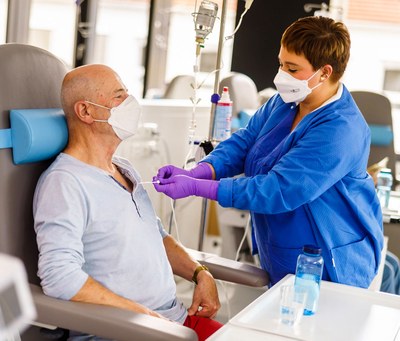Medication therapy
Medication or drug therapy forms is one of the pillars of cancer therapy alongside surgery and radiation. Unlike surgery and radiation, medication therapy acts not only locally at the site of application, but systemically throughout the body. Medication therapies include the classic chemotherapies as well as targeted therapies and immunotherapies.

Since cytostatic drugs do not act specifically on tumor cells, the therapy can also damage these healthy cells leading to typical chemotherapy side effects. In most cases, chemotherapy is administered intravenously, but it can also administered orally in the form of tablets.
A precondition for the use of targeted therapies is the presence of a vulnerable structure on or in the tumor cells. This is investigated in the course of immunohistochemical and molecular pathological diagnostics on the tumor material. These vulnerable structures include, for example, markers on the cell surface or signaling molecules within the cell that ensure the survival of the tumor cells. Modulation of these structures by means of targeted therapy leads to tumor cell death. However, these target structures also occur to a lesser extent on and in healthy cells. Therefore, these drugs also have side effects. Targeted therapies can be administered intravenously, orally, or as an injection under the skin (subcutaneously).
Immunotherapies (e.g. checkpoint inhibitors) enable the body's immune system to better recognize tumor cells so it can fight them. However, activation of the immune system can lead to an excessive immune response in healthy tissue, so side effects may result. Immunotherapies are administered intravenously.
Interdisciplinary tumor boards recommend the best individual treatment for each patient.
Medication therapy at NCT/UCC can be carried out on an outpatient basis in the Day Care Unit or on an inpatient basis in one of the participating specialist clinics. Sixty treatment places are available (40 therapy chairs and 20 beds) in the NCT/UCC Day Care Unit in the portal building (building 31c) and in the NCT/UCC new building (building 136). Patients are treated and cared for during therapy by a professional team of physicians and nurses with special oncology training. Outpatient treatment should be easily accessible. We therefore also endeavor to refer patients to a cooperating hemato-oncological practice or clinic close to their place of residence.
All modern drug therapies are available at the NCT/UCC. In many cases, patients can also benefit from promising new approaches within the framework of clinical trials.
For more information, visit the Cancer Information Service website:


